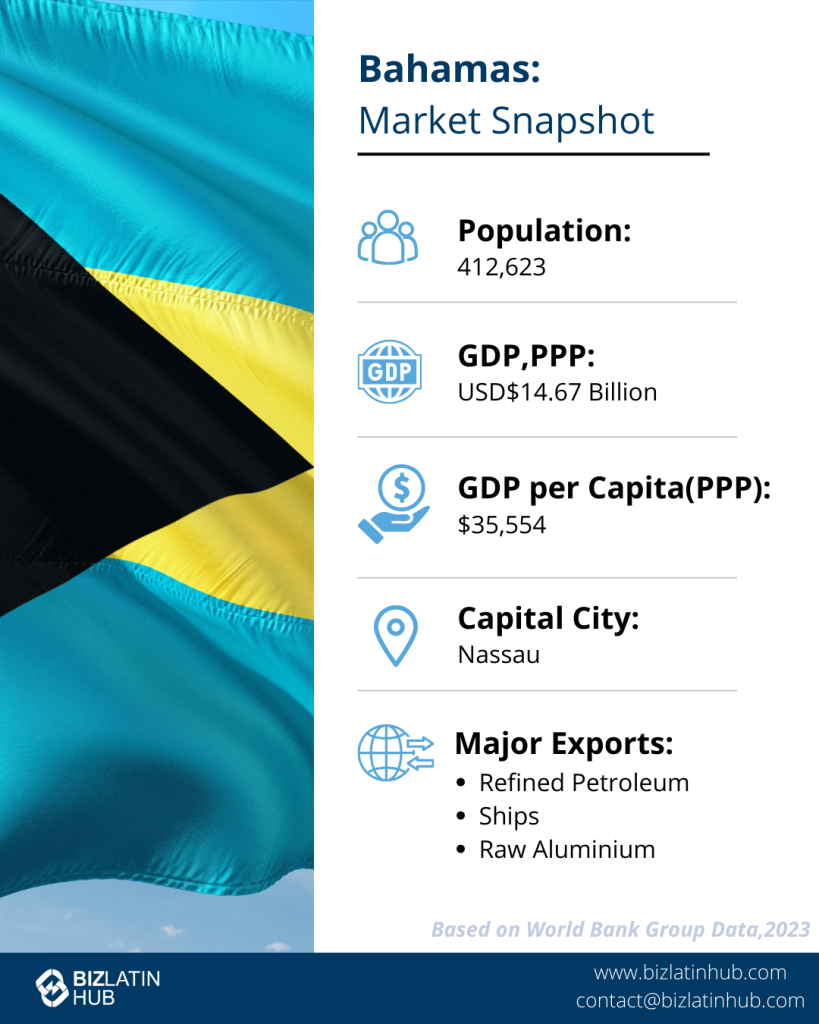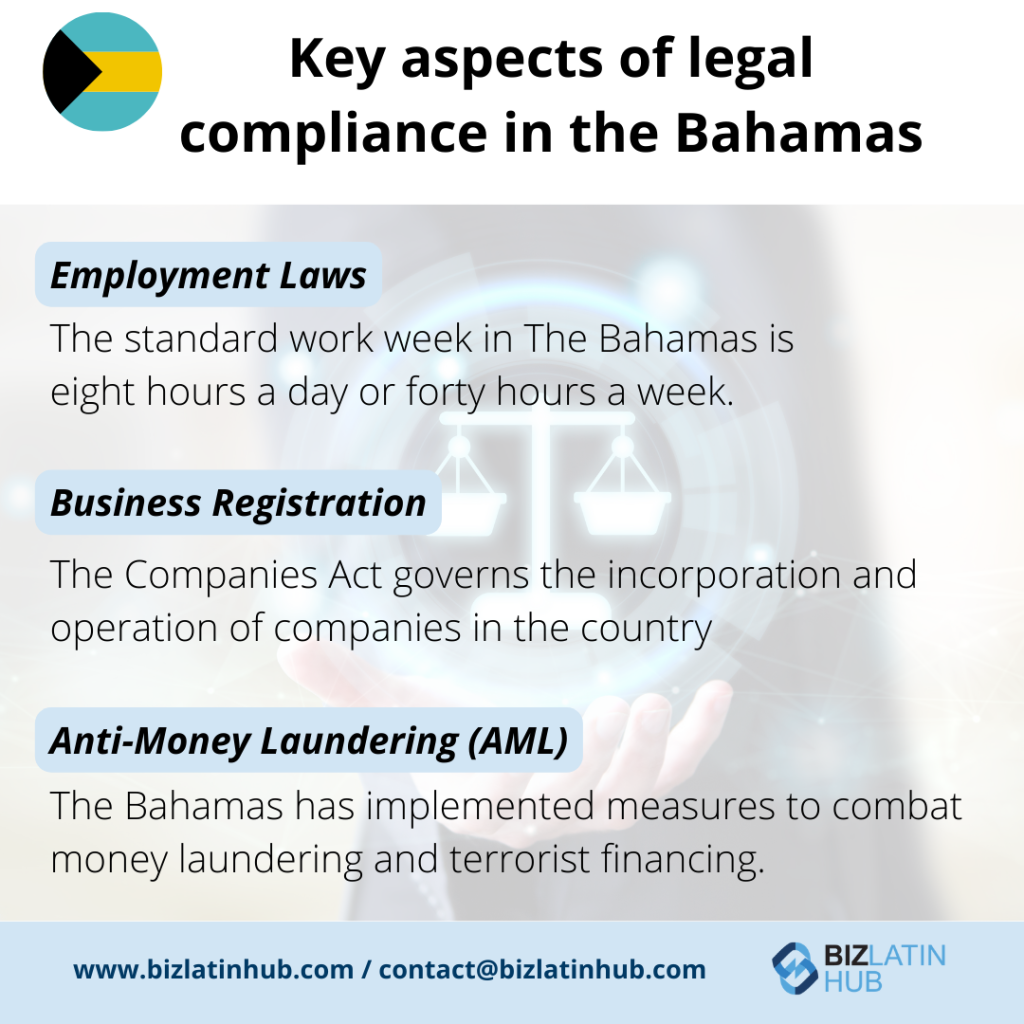Hiring staff in the Bahamas presents unique opportunities and challenges. The country’s vibrant economy attracts diverse talent, making effective recruitment crucial for businesses.
Understanding the local employment laws is essential for navigating the hiring landscape. Familiarity with everything from minimum wage regulations to workplace safety standards lays a solid foundation for any hiring process.
What are the Bahamian Employment Laws?
The Bahamas has clear employment laws designed to protect workers. The Employment Act provides guidelines for minimum wage, working hours, and fair dismissal practices. Employers must follow legal steps for terminating employees, with notice periods based on job position and length of employment. Employers also need to contribute to the National Insurance Board, covering benefits such as unemployment and maternity.

Employment Contracts
In the Bahamas, employment contracts are crucial. These contracts outline the terms of the job, covering duties, pay, hours, and conditions. They must comply with the Bahamas Employment Act, which sets the basics for work hours and leave. Both employers and employees should understand these contracts to prevent disputes.
Minimum Wage Regulations
Employers in the Bahamas must pay the minimum wage set by law. They are also responsible for complying with overtime rules and ensuring fair pay. Employers need to offer bonuses and other payments, following legal requirements. Meeting these wage standards helps avoid disputes in the workplace.
Workplace Safety Standards
Ensuring safety at work is a must in the Bahamas. Employers need to follow health and safety regulations to protect employees from risks. They should implement safety measures and provide training. By doing so, they maintain a secure work environment and promote harmony at work.
Employee Benefits and Rights
Employees in the Bahamas have rights to various benefits. These include social security insurance, covering situations like sickness and maternity. Employers also need to provide certain leaves, such as annual and sick leave. Contributions to the National Insurance Board by employers fund benefits for employees, ensuring protection under the Employment Act.
Preparing for the Hiring Process
Hiring in the Bahamas involves understanding several key aspects. Employment contracts play a critical role. These documents define terms, working hours, wages, and how employment ends. Employers must respect minimum wage laws. This ensures fair pay, including overtime and bonuses. Knowing workplace health and safety rules helps protect employees from hazards. This prevents risks. A clear understanding of contracts avoids disputes and keeps the workplace peaceful. However, using an Employer-of-Record (EOR) can be costly, around $500 monthly per employee. This might affect hiring decisions.
Identifying Workforce Needs
Businesses in the Bahamas often focus on local recruitment. This helps tap into the local talent pool and supports community well-being. However, specialized skills in some industries are hard to find. Thus, identifying and addressing specific needs is crucial. Skill development initiatives improve the local workforce’s abilities. This helps meet business demands. Promoting diversity and inclusion enriches the talent pool. It brings various perspectives, important for understanding workforce needs. Access to a skilled workforce especially aids tourism and financial services sectors.
Crafting Effective Job Descriptions
In the Bahamas, job descriptions should specify qualifications and work experience needed. Employers value cultural fit and language skills. These ensure alignment with company values. Descriptions must assess communication skills and enthusiasm. This is important during initial screening. Detailing required technical skills enhances job descriptions. Skills assessments may be part of hiring. Face-to-face interactions are common, so job descriptions should emphasize personal connections with candidates.
Knowing the Types of Employment Contracts
In the Bahamas, contracts can be verbal or written, but writing is common practice. The Employment Act demands essential terms, like job duties and pay. These must be shared promptly after work starts. Contracts usually detail the employer’s name, employee ID, job nature, wages, and benefits. Fixed-term contracts are popular. The Employment Act does not set specific terms for these. The minimum wage is $260 per week. Contracts must state wage rates, payment periods, and benefits clearly.
Identifying Workforce Needs
Identifying workforce needs in the Bahamas requires targeted strategies. Businesses must engage in local recruitment to access the available talent pool. However, some industries face limited specialized skills, which complicates local hiring efforts. Here are key steps for addressing these challenges:
- Skill Development
Businesses should support initiatives that enhance local skills through education and training. This step is crucial to meet the growing needs of various sectors. - Diversity and Inclusion
Embracing diversity allows businesses to gain diverse perspectives, helping to identify and fulfill workforce needs effectively. - Sector-Specific Recruitment
Align recruitment efforts with sector requirements, especially in tourism and financial services. This ensures a skilled and educated workforce.
Needs & Solutions Table
| Need | Solution |
|---|---|
| Specialized skills | Education programs |
| Diverse workforce | Inclusion policies |
| Sector alignment | Targeted recruitment |
Employers benefit from a skilled workforce, which enhances productivity and supports the community. By addressing these needs, businesses contribute positively to the Bahamian economy.
Crafting Effective Job Descriptions
Crafting effective job descriptions in the Bahamas requires clarity and precision. Employers should specify the required academic and professional qualifications for the role. Outline relevant work experience needed. Highlight cultural fit and language proficiency to align with company values. It is crucial to assess candidates’ communication skills and enthusiasm. These factors play a key role in the initial screening process.
Include necessary technical skills in the job description. This can help incorporate skills assessments in the hiring process. Employers should mention the importance of personal interaction during interviews. This creates a connection with potential candidates.
Here is a quick checklist for crafting effective job descriptions:
- List essential qualifications.
- Highlight relevant work experience.
- Emphasize cultural fit.
- Assess communication skills.
- Include technical skills.
- Stress the importance of face-to-face interaction.
By following these guidelines, employers can attract suitable candidates for positions in the Bahamas.
Knowing the Types of Employment Contracts
In the Bahamas, employment contracts can be either verbal or written. Most employers prefer written documentation. The Employment Act requires that details such as job duties and compensation be shared with employees right at the start.
Here are key elements of Bahamian employment contracts:
- Employer’s Name
- Employee Identification
- Nature of Employment
- Wages and Benefits
Fixed-term contracts are popular among Bahamian employers because there are no specific rules for these agreements in the Employment Act. The minimum wage is $260 per week. Contracts should specify wages and benefits clearly.
Table: Common Contract Features
| Feature | Description |
|---|---|
| Job Duties | Tasks the employee must perform |
| Compensation | Pay rate and schedule |
| Benefits | Health insurance, if applicable |
Always ensure that these details are included in your employment contract. This transparency helps maintain a good employment relationship.
Job Posting Strategies
In the Bahamas, employers must advertise job vacancies locally first. This is a requirement before seeking foreign workers. The goal is to give Bahamian residents job opportunities. Employers should ensure compliance with Bahamian employment laws during this process.
Utilizing Local Job Boards and Websites
Employers can post job openings on popular platforms like BahamasLocal, JobSeekers Bahamas, and CaribbeanJobs. These websites help screen and find candidates. The Bahamian recruitment industry relies heavily on tourism, finance, and construction sectors. With a workforce of about 400,000 people, finding specialized talent can be challenging. Recruitment agencies can help by connecting companies with local talent and managing legal considerations.
Table: Popular Job Websites in the Bahamas
| Website Name | Purpose |
|---|---|
| BahamasLocal | Job postings and candidate screening |
| JobSeekers Bahamas | Local job listings and applications |
| CaribbeanJobs | Regional employment opportunities |
Leveraging Social Media Platforms
Social media and local job boards can access the local talent pool efficiently. Specialized recruitment agencies broaden international talent searches. Engaging with local strategies promotes community well-being through job creation. Companies can partner with local agencies to streamline hiring and identify top talent. It is important to define hiring criteria to match candidates effectively.
Collaborating with Recruitment Agencies
Partnering with local recruitment agencies simplifies the hiring process. Define your needs, including skills and experience, before selecting an agency. Choose Bahamas-based services familiar with the local market. These agencies offer insights into hiring challenges and opportunities in the Bahamas. Combining local and international strategies improves chances of finding the right candidates. Recruitment agencies in the Bahamas ensure compliance with employment laws while sourcing candidates.
By following these strategies and utilizing the right tools, employers can effectively recruit in the Bahamian job market. Through proper planning and collaboration, hiring in the Bahamas becomes a more manageable undertaking.
Screening Candidates Effectively
Establishing an effective screening process is crucial for hiring in the Bahamas. A structured procedure improves recruitment efficiency and effectiveness. Using services like the Online Recruiters Directory connects employers with pre-screened recruiters. This speeds up the process of finding qualified candidates. Conducting a thorough requirements analysis helps identify necessary qualifications and skills. Employers can select the best candidates by understanding these needs.
Reading feedback and reviews of recruiting firms helps select suitable partners for hiring. This ensures access to quality prospects. Flexible hiring options, such as using independent contractors, can reduce costs and quicken recruitment compared to traditional methods.
Developing a Structured Screening Process
A structured screening process ensures consistent and fair candidate evaluation. This reduces bias in hiring decisions. Using a standardized set of criteria that aligns with job requirements enhances the screening process’s effectiveness.
Incorporating tests relevant to the job’s needed skills provides insight into candidates’ abilities. Documenting evaluation criteria and feedback promotes transparency. Regularly reviewing and updating the process helps meet changing workforce needs, improving hiring outcomes.
Conducting Background Checks
Conducting thorough background checks is important in the Bahamas. Employers verify a candidate’s work history, performance, and character. These checks confirm the accuracy of the information provided by candidates. This ensures legal compliance and maintains the integrity of the hiring process. Employers also conduct tasks or exams to ensure candidates meet performance expectations.
Before hiring foreign workers, employers must ensure no suitable Bahamian individuals are available. Verification of the local job market emphasizes this requirement. Background checks mitigate risks and uphold the hiring process’s standards and integrity.
Importance of Reference Checks
Reference checks validate a candidate’s work history and performance claims. Contacting previous employers or references assesses the candidate’s character and organizational fit. Reference checks safeguard the hiring process’s integrity and minimize risks.
In the Bahamas, reference checks ensure compliance with employment legal requirements. Conducting background checks alongside reference verification enhances candidates’ information reliability. Employers view this as an essential step in making informed employment decisions.
Interviewing Potential Employees
Employers in The Bahamas must create clear employment contracts. These contracts should outline job duties, pay, hours, and work conditions. This adheres to local labor standards. Doing so promotes fairness in the hiring process.
Bahamian labor laws, like the Employment Act, set employment standards. Employers should know these during interviews to attract qualified candidates. Employers hiring foreign nationals must prove Bahamian candidates are not fit for the role. This affects who they choose to interview.
Understanding tax rules such as National Insurance contributions is crucial. These factors impact what potential employees expect during interviews. Knowledge of employee leave and benefits is also key. It helps employers confidently answer candidate questions, making the company more attractive.
Crafting Effective Interview Questions
Employers must know health and safety regulations. This ensures employee welfare. It’s crucial when hiring. Understanding Bahamian employment laws on leave helps form relevant interview questions. These questions should align with company policies.
Knowing about benefits like health insurance and pensions is beneficial. This enhances questions aimed at attracting skilled candidates. Awareness of termination rules is important. It helps in crafting questions about workplace policy knowledge and compliance.
Dispute resolution knowledge aids in gauging candidate conflict management skills. Questions can reflect a candidate’s approach to problem-solving at work.
Assessing Skills and Cultural Fit
In The Bahamas, integrating new employees into the workplace culture is vital. It fosters belonging and inclusivity during onboarding. Cultural sensitivity training is a significant part of this process. It ensures new hires appreciate The Bahamas’ cultural diversity.
Team-building activities and mentorship programs strengthen connections. They bond new hires with colleagues. Onboarding improves with feedback from new employees about their experiences.
This feedback helps refine the process. The onboarding experience is dynamic, adapting to organizational and employee needs.
Techniques for Conducting Fair Interviews
Researching the company and its values is important. This ensures alignment and fair evaluations in interviews. Understanding Bahamian cultural nuances helps create a respectful, inclusive environment.
Professional attire showcases the company’s commitment to fairness. Using multiple interview rounds, both one-on-one and panels, assesses a candidate’s fit comprehensively.
Conversational interview elements encourage candidates to share experiences openly. This fosters fairness and equity in the interview atmosphere.
Onboarding New Employees
The onboarding process in the Bahamas is efficient. It can be completed in just 1-2 working days when the new employee submits all required information. This process helps ensure compliance with local labor laws. For non-nationals, it may take an extra 1-3 days due to the Right to Work assessment. Employers seek feedback from new hires to improve onboarding continuously. Activities focus on fostering belonging through team-building and cultural sensitivity sessions.
Creating a Comprehensive Onboarding Plan
A comprehensive plan in the Bahamas emphasizes cultural integration and team cohesion. It involves team-building activities, mentorship, and cultural sensitivity training. Feedback from new hires helps refine the onboarding process. Employers focus on inclusivity to ensure new employees feel connected. Permanent employment contracts detail job responsibilities and are explained during onboarding to set clear expectations.
Familiarizing New Hires with Company Culture
Introducing new hires to company culture is crucial, especially for foreign recruits. Emphasizing cultural diversity improves innovation and competitiveness. Businesses should foster an inclusive environment where all employees feel valued. A mixed recruitment strategy, combining local and international talent, creates a dynamic team. Effective onboarding that highlights company values enhances collaboration and enriches workplace culture.
Ensuring Compliance with Legal Requirements
Employers must ensure that employment contracts align with Bahamian labor laws. These documents should clearly outline duties, pay, and working conditions. The Bahamas Ministry of Labour enforces these laws. Foreign nationals need a valid work permit. Employers must show that no Bahamian is available for the job. Compliance includes adhering to income tax and National Insurance rules. An Employer of Record can assist businesses in complying with all labor regulations in the Bahamas.
Understanding Work Permits
Foreign nationals seeking employment in the Bahamas must get a valid work permit. This ensures no suitable local candidates are available before hiring. The Bahamas Department of Immigration issues these permits. It ensures the hiring process does not harm local job seekers. Employers must first advertise the job locally for at least two weeks. An Annual Work Permit fits those working in the Bahamas for one year. It can be renewed if eligibility requirements are met.

Types of Work Permits in the Bahamas
There are two main types of work permits in the Bahamas:
- Short-term Work Permit: This allows employment for up to 90 days.
- Long-term Work Permit: This is for employment longer than three months.
Additional permits include:
- Employment Work Permit: For general employment.
- Expatriate Work Permit: For specialized roles.
- Temporary Work Permit: For short-term or seasonal jobs.
Employers apply for these on behalf of foreign employees. They must give Bahamians a chance to apply before proceeding with the application.
Application Process for Work Permits
Employers must apply for work permits through the Department of Immigration. They need to submit proof of no suitable local candidates and include health and background checks. Different work permits include short-term (up to 90 days) and long-term (over three months). Employers must advertise the job for two weeks locally. The permit issuance is at the Director of Immigration’s discretion. Applicants must provide evidence of a job offer from a Bahamian employer.
Legal Considerations for Foreign Workers
Foreign workers need a valid work permit before being hired in the Bahamas. Employers must show no suitable local candidates are available. Work permits include the Employment, Expatriate, Temporary, and Self-Employed Work Permits. Employment contracts should clearly outline duties, pay, hours, and working conditions. They must comply with local labor standards. The National Insurance Board requires contributions from both employers and employees. This includes benefits like unemployment and maternity coverage. Employers must follow immigration laws and requirements for health and background checks.




